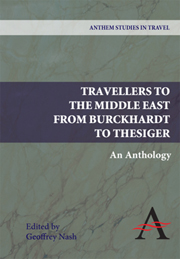Book contents
- Frontmatter
- Contents
- Acknowledgements
- Introduction
- PART ONE THE COMING OF EMPIRE 1800–1879
- PART TWO COLONIALISM AND RESISTANCE 1880–1950
- Ottoman and Former Ottoman Territories
- 1 A Wandering Scholar in the Levant
- 2 Dar-ul-Islam
- 3 Turkey in Revolution
- 4 An Englishwoman in a Turkish Harem
- 5 Three Deserts
- 6 Letters from Palestine, 1932–1936
- Arabia
- Persia/Iran
- Bibliography
2 - Dar-ul-Islam
from Ottoman and Former Ottoman Territories
Published online by Cambridge University Press: 05 March 2012
- Frontmatter
- Contents
- Acknowledgements
- Introduction
- PART ONE THE COMING OF EMPIRE 1800–1879
- PART TWO COLONIALISM AND RESISTANCE 1880–1950
- Ottoman and Former Ottoman Territories
- 1 A Wandering Scholar in the Levant
- 2 Dar-ul-Islam
- 3 Turkey in Revolution
- 4 An Englishwoman in a Turkish Harem
- 5 Three Deserts
- 6 Letters from Palestine, 1932–1936
- Arabia
- Persia/Iran
- Bibliography
Summary
Believing his son's lungs should not be exposed to English winters, Mark Sykes' father took him with him on journeys through the continents of Europe, Asia, Africa and America in the 1880s and 1890s. These early travels may have contributed to Sykes' distaste for modernity and helped form the essentializing statements about the East we frequently find in his travel writings. In the late 1890s he traversed Palestine, Syria and Iraq and Through Five Turkish Provinces, a write-up of these journeys, appeared in 1899. Returning to Syria and eastern Turkey in 1903, he published Dar-ul-Islam the following year. Sykes had by now acquired a mannered jokey style à la Kinglake, with burlesque passages of dialogue that look forward to Robert Byron. To this he added an opinionated array of pseudo-authoritative observations on the racial characteristics of the diverse peoples of the eastern Ottoman lands. Strongly pro-Turk, he disparaged their subject races, especially the Armenians and Jews. The Caliphs' Last Heritage (1915) mixes an extensive history of the Ottomans with narrative of journeys through Ottoman territory made from 1906 almost yearly until 1913. As the title implies, Sykes saw the current Near East in terms of a noble but dying civilization; but not content with decrepitude ‘instead of respecting their own traditions, Easterners had caught the Western contagion of progress’ (Adelson 1975: 101).
- Type
- Chapter
- Information
- Travellers to the Middle EastAn Anthology, pp. 148 - 154Publisher: Anthem PressPrint publication year: 2009



